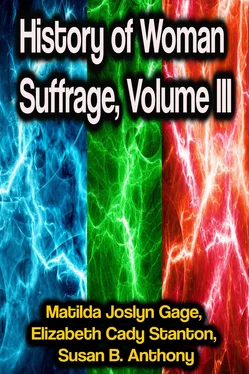That a number of citizens of the United States have been killed, there can be no question; but that is not enough to enable the government of the United States to interfere for their protection. Under the constitution that duty belongs to the State alone. But when an unlawful combination is made to interfere with any of the rights of natural citizenship secured to citizens of the United States by the national constitution, then an offense is committed against the laws of the United States, and it is not only the right but the absolute duty of the national government to interfere and afford the citizens that protection which every good government is bound to give.
General Hawley, in an address before a college last spring, said:
Why, it is asked, does our government permit outrages in a State which it would exert all its authority to redress, even at the risk of war, if they were perpetrated under a foreign government? Are the rights of American citizens more sacred on the soil of Great Britain or France than on the soil of one of our own States? Not at all. But the government of the United States is clothed with power to act with imperial sovereignty in the one case, while in the other its authority is limited to the degree of utter impotency, in certain circumstances. The State sovereignty excludes the Federal over most matters of dealing between man and man, and if the State laws are properly enforced there is not likely to be any ground of complaint, but if they are not, the federal government, if not specially called on according to the terms of the constitution, is helpless. Citizen A.B., grievously wronged, beaten, robbed, lynched within a hair's breadth of death, may apply in vain to any and all prosecuting officers of the State. The forms of law that might give him redress are all there; the prosecuting officers, judges, and sheriffs, that might act, are there; but, under an oppressive and tyrannical public sentiment, they refuse to move. In such an exigency the government of the United States can do no more than the government of any neighboring State; that is, unless the State concerned calls for aid, or unless the offense rises to the dignity of insurrection or rebellion. The reason is, that the framers of our governmental system left to the several States the sole guardianship of the personal and relative private rights of the people.
Such is the imperfect development of our own nationality in this respect that we have really no right as yet to call ourselves a nation in the true sense of the word, nor shall we have while this state of things continues. Thousands have begun to feel this keenly, of which a few illustrations may suffice. A communication to the New York Tribune , June 9, signed "Merchant," said:
Before getting into a quarrel and perhaps war with Mexico about the treatment of our flag and citizens, would it not be as well, think you, for the government to try and make the flag a protection to the citizens on our own soil?
That is what it has never been since the foundation of our government in a large portion of our common country. The kind of government the people of this country expect and intend to have—State rights or no State rights, no matter how much blood and treasure it may cost—is a government to protect the humblest citizen in the exercise of all his rights.
When the rebellion of the South against the government began, one of the most noted secessionists of Baltimore asked one of the regular army officers what the government expected to gain by making war on the South. "Well," the officer replied, laying his hand on the cannon by which he was standing, "we intend to use these until it is as safe for a Northern man to express his political opinions in the South, as it is for a Southern man to express his in the North." Senator Blaine, at a banquet in Trenton, N. J., July 2, declared that a "government which did not offer protection to every citizen in every State had no right to demand allegiance." Ex-Senator Wade, of Ohio, in a letter to the Washington National Republican of July 16, said of the president's policy:
I greatly fear this policy, under cover of what is called local self-government, is but an ignominious surrender of the principles of nationality for which our armies fought and for which thousands upon thousands of our brave men died, and without which the war was a failure and our boasted government a myth.
Behind the slavery of the colored race was the principle of State rights. Their emancipation and enfranchisement were important, not only as a vindication of our great republican idea of individual rights, but as the first blow in favor of national unity—of a consistent, homogeneous government. As all our difficulties, State and national, are finally referred to the constitution, it is of vital importance that that instrument should not be susceptible of a different interpretation from every possible standpoint. It is folly to spend another century in expounding the equivocal language of the constitution. If under that instrument, supposed to be the Magna Charta of American liberties, all United States citizens do not stand equal before the law, it should without further delay be so amended as in plain, unmistakable language to declare what are the rights, privileges, and immunities that belong to citizens of a republic.
There is no reason why the people of to-day should be governed by the laws and constitutions of men long since dead and buried. Surely those who understand the vital issues of this hour are better able to legislate for the living present than those who governed a hundred years ago. If the nineteenth century is to be governed by the opinions of the eighteenth, and the twentieth by the nineteenth, the world will always be governed by dead men....
The cry of centralization could have little significance if the constitution were so amended as to protect all United States citizens in their inalienable rights. That national supremacy that holds individual freedom and equality more sacred than State rights and secures representation to all classes of people, is a very different form of centralization from that in which all the forces of society are centered in a single arm. But the recognition of the principle of national supremacy, as declared in the fourteenth and fifteenth amendments, has been practically nullified and the results of the war surrendered, by remanding woman to the States for the protection of her civil and political rights. The Supreme Court decisions and the congressional reports on this point are in direct conflict with the idea of national unity, and the principle of States rights involved in this discussion must in time remand all United States citizens alike to State authority for the protection of those rights declared to inhere in the people at the foundation of the government.
You may listen to our demands, gentlemen, with dull ears, and smile incredulously at the idea of danger to our institutions from continued violation of the civil and political rights of women, but the question of what citizens shall enjoy the rights of suffrage involves our national existence; for, if the constitutional rights of the humblest citizen may be invaded with impunity, laws interpreted on the side of injustice, judicial decisions based not on reason, sound argument, nor the spirit and letter of our declarations and theories of government, but on the customs of society and what dead men are supposed to have thought, not what they said—what will the rights of the ruling powers even be in the future with a people educated into such modes of thought and action? The treatment of every individual in a community—in our courts, prisons, asylums, of every class of petitioners before congress—strengthens or undermines the foundations of that temple of liberty whose corner-stones were laid one century ago with bleeding hands and anxious hearts, with the hardships, privations, and sacrifices of a seven years' war. He who is able from the conflicts of the present to forecast the future events, cannot but contemplate with anxiety the fate of this republic, unless our constitution be at once subjected to a thorough emendation, making it more comprehensively democratic.
Читать дальше












